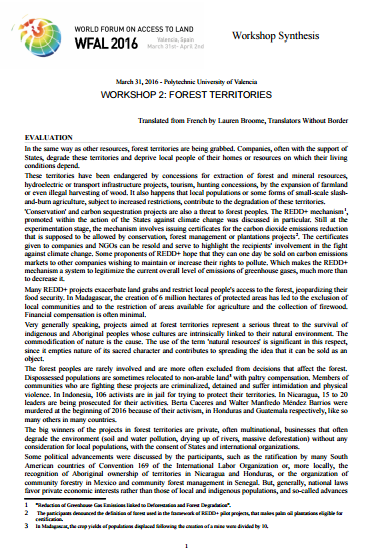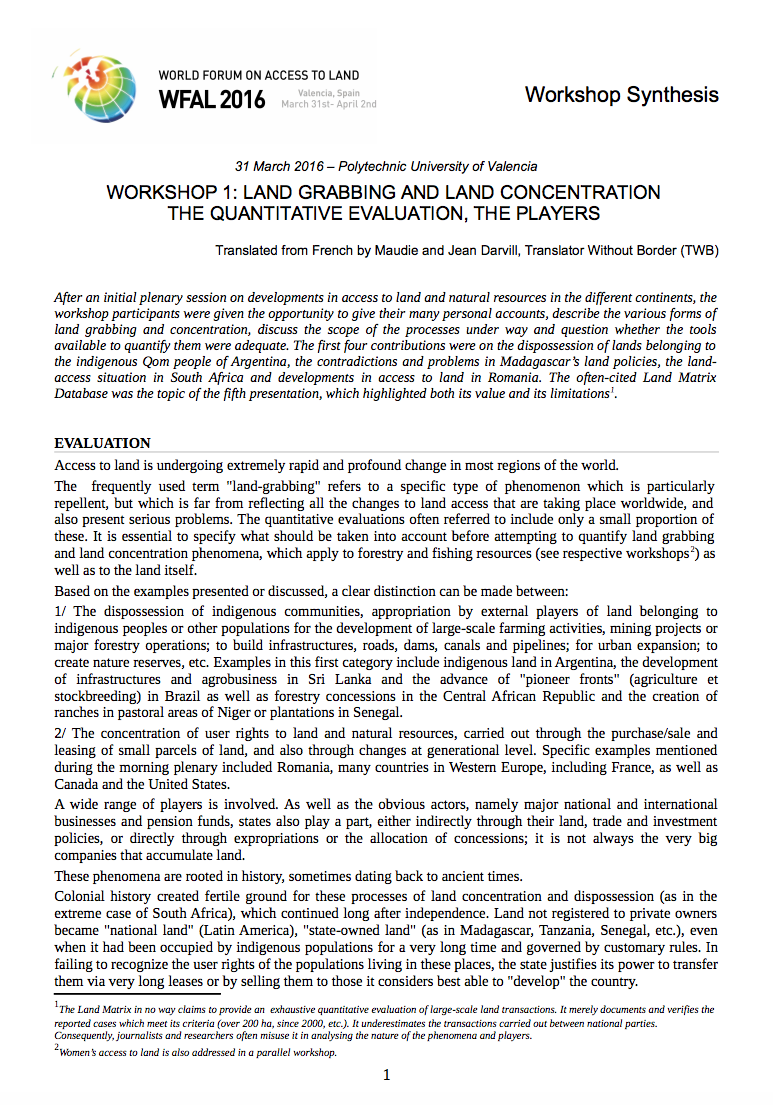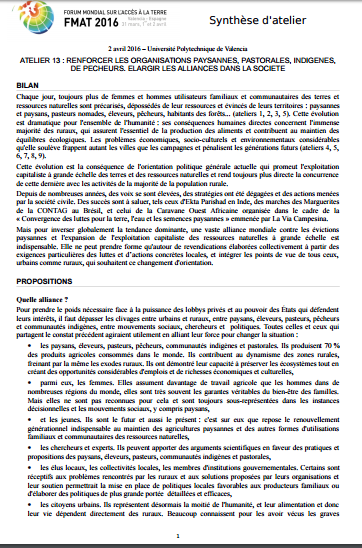Location
The goal of the WFAL 2016 had been to organise a world forum in 2016 to address the major issues linked to unequal access to land, natural resources (see The Call). Finally, the global assembly took place in Valencia, Spain (31st March, 1-2 April 2016) with more than 400 participants from 70 countries from today at the Global Forum on Access to Land and Natural Resources.
Ten years after the World Forum on Agrarian Reforms (Valencia, Spain, 2004) and the International Conference on Agrarian Reform and Rural Development (Porto Alegre, Brazil, 2006) the trends seemed unchanged if not worse.
Making a precise assessment of the situation had been imperative. An evaluation of the short and long terms consequences had been essential. It couldn’t must ignore none of the great economical, social, political and environmental prejudices due to the ongoing processes. It was the condition to identify responses able to solve the problems.
Implementing such an analysis had been possible according to the signatories of the WFAL 2016 Call, if citizens from every continent and the organizations in charge of representing or guaranteeing their interets could effectively debate into a structured and contradictory process: farmer and other civil society organisations, governmental organisations, indepedant or public research institutes.
The WFAL 2016 Call aimed at creating the conditions necessary for such a debate, with the guarantee that each one’s point of view and analysis had been taken into consideration by all, towards the invention of the most constructive proposals.
Members:
Resources
Displaying 1 - 5 of 25WORKSHOP 3: HALIEUTIC RESOURCES
We are currently seeing the development of a set of laws and practices preventing artisanal fishermen and their communities from having rights to fishing stock. The topic of halieutic resources generally provokes little interest when raised in relation to natural resources grabbing, despite the fact that millions of people’s income earning rely on fishing and aquaculture1. In the same way, fishing is vital to ensuring global food security. In many countries, fish is the largest source of high-quality animal protein for people and form an important part of their diet.
WORKSHOP 2: FOREST TERRITORIES
In the same way as other resources, forest territories are being grabbed. Companies, often with the support of States, degrade these territories and deprive local people of their homes or resources on which their living conditions depend.
Workshop 1: Land Grabbing and Land Concentration The Quantitative Evaluation, The Players
After an initial plenary session on developments in access to land and natural resources in the different continents, the workshop participants were given the opportunity to give their many personal accounts, describe the various forms of land grabbing and concentration, discuss the scope of the processes under way and question whether the tools available to quantify them were adequate.
ATELIER 13 : RENFORCER LES ORGANISATIONS PAYSANNES, PASTORALES, INDIGENES, DE PECHEURS. ELARGIR LES ALLIANCES DANS LA SOCIETE
Chaque jour, toujours plus de femmes et hommes utilisateurs familiaux et communautaires des terres et ressources naturelles sont précarisés, dépossédés de leur ressources et évincés de leurs territoires : paysannes et paysans, pasteurs nomades, éleveurs, pêcheurs, habitants des forêts… (ateliers 1, 2, 3, 5). Cette évolution est dramatique pour l’ensemble de l’humanité : ses conséquences humaines directes concernent l’immense majorité des ruraux, qui assurent l’essentiel de la production des aliments et contribuent au maintien des équilibres écologiques.
WORKSHOP 13: STRENGTHENING RURAL, PASTORAL, INDIGENOUS, AND FISHING ORGANISATIONS. BROADENING ALLIANCES ACROSS SOCIETY
Every day, more and more family/small holder users of land and natural resources find themselves made more insecure, deprived of their resources and evicted from their land. This affects peasants, nomadic herders, livestock farmers, fishermen and fisherwomen, forest dwellers … (Workshops 1, 2, 3, 5). This change is a dramatic one, affecting the whole of humanity. The direct human consequences of this change affect the vast majority of rural residents, who carry out the essential work of food production and contribute to maintaining ecological balance.




